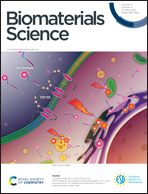A targeted near-infrared nanoprobe for deep-tissue penetration and imaging of prostate cancer†
Abstract
The current challenge in fluorescence guided surgery (FGS) for prostate cancer (PCa) is in the design of imaging probes with high selectivity, clear visualization of tumour margins, and minimal toxicity. This report aims to design and develop a novel NIR-nanoprobe, and evaluate its potential in the penetration of PCa tumour tissues. The PSMA receptor-targeted quantum dot (PSMA-QD655) is a NIR, deep-tissue imaging agent, which has the potential for intraoperative navigation during surgery and improved detection specificity for PCa. The probe was designed and synthesized by conjugating functionalized amino-PEG quantum dots (QDs) through a heterobifunctional linker to a DUPA targeted polypeptide construct. The nanoprobe was evaluated in vitro in PSMA+ PCa cell lines for specificity and its binding affinity was determined by flow cytometric analysis. The penetration efficacy was tested further on large PCa 3D tumour spheroids (dia ∼1200 μm, thickness ∼450 μm) by deep tissue multiphoton imaging. PSMA-QD655 was found to be an efficient deep tissue intra-operative guided surgical tool with a high affinity (KD = 15.3 nM) and penetrative capacity. The results have been demonstrated in vitro in 2D and 3D tissue models, mimicking cancer lesions in vivo. In summary, we have developed a deep-tissue imaging NIR nanoprobe targeting prostatic lesions that (i) binds to PSMA+ tumour with sub-nanomolar affinity and high specificity, (ii) shows an excellent safety profile in primary cell lines in vitro and (iii) shows high penetrative capacity in a 3D prostate tumour model (∼450 μm tissue depth).



 Please wait while we load your content...
Please wait while we load your content...